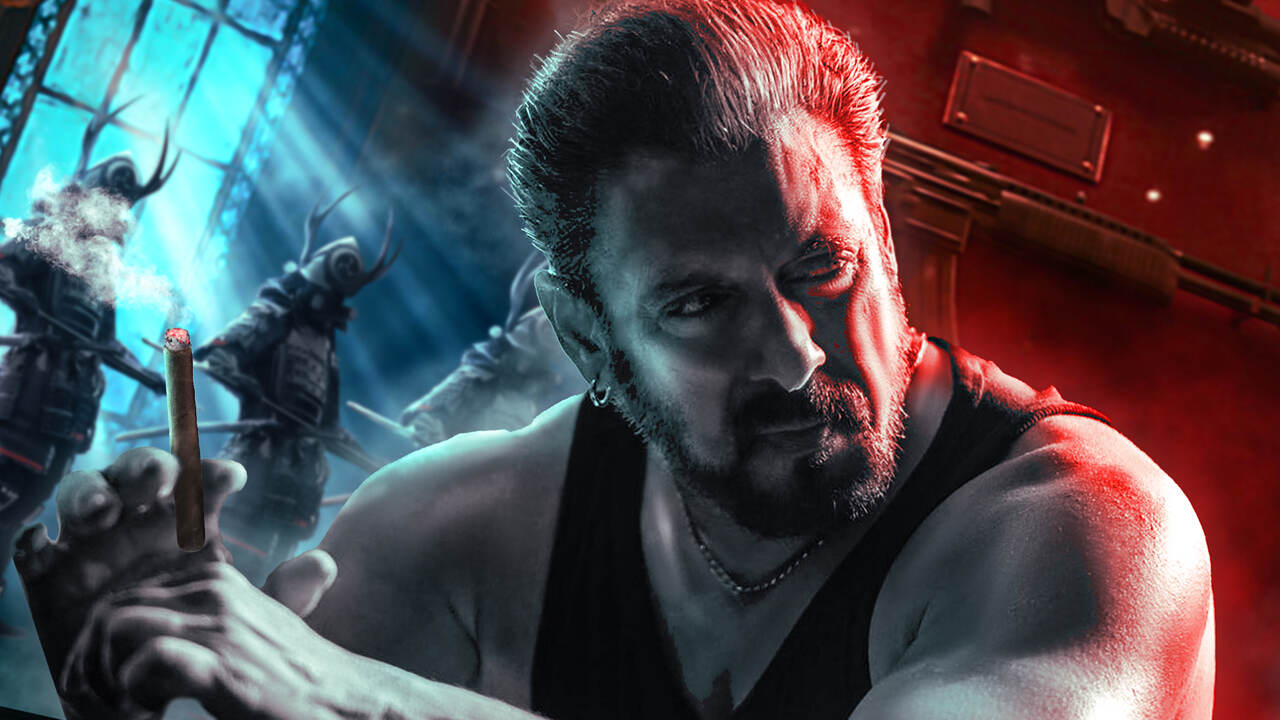
I think I am suffering from the Rashmika Mandanna fatigue. She is in Mission Majnu, Pushpa, Animal, Chhaava, and now Sikandar, and her characters in these films are interchangeable. The Nasreen Khan of Mission Majnu, who merely praises her husband and constantly tells him how much he means to her, can very well be Yesubai Bhonsale of Chhaava, who wants her husband to be born as her son so that he can experience the affection of a mother. The Srivalli of Pushpa, who both loves and scolds her husband, is very similar to Geetanjali of Animal. As a princess named Saisri Rajkot, Mandanna continues her "I can die for my husband" streak with Sikandar. The titular character, played by Salman Khan, has little time for romance, but he does love her. Still, he is so busy looking after his people (the citizens of Rajkot) that he doesn't get to spend quality time with his princess. And yet, she becomes pregnant. Call it Bhai magic because when Saisri asks for Sanjay's complete attention, she merely ends up singing the Lag Jaa Gale song. Lata Mangeshkar must surely be crying somewhere. The audience, meanwhile, cries in the theater. Sanjay, too, isn't able to bear her voice, so he puts his hands on her lips. This Raja Sahab is so polite that he cannot say, "Shut up." This is the best and most heroic thing Khan does in Sikandar, although I admit I had begun to hope that we wouldn't get to the Lag Jaa Gale bit, given what happens to Saisri early in the film. Spoilers start from the next paragraph.
Saisri - a dutiful, obedient wife - spends all her time cheering and caring for her husband and then meets her maker (how does Sanjay mourn? By singing a song. The Bhai magic is sadly not present in the vocal cords). She is fatally injured by shards, thanks to a big explosion. This situation could have been easily avoided with some intelligence. All Saisri had to do was take cover and shout, "Bomb!" But she wastes time screaming, "Sanjay! Sanjay!" instead of warning her husband about those about-to-explode bombs. A. R. Murugadoss, though, takes this opportunity to go in an interesting direction. We see one-sided WhatsApp messages, and when asked about Saisri's zodiac sign, Sanjay looks clueless. Murugadoss criticizes these macho mass heroes for ignoring their love interests. This criticism, expectedly, doesn't go deep or far. Sanjay cries a lot and misses his wife a lot. The only thing he doesn't do is correct his mistake - he displays no enthusiasm for learning about Saisri or her work. In one of the scenes, Saisri isn't able to show Sanjay one of her paintings due to his busy schedule. After her death, Sanjay doesn't even bother to look at that painting, or any other painting, for that matter. Honestly, wives like Saisri are utterly dull. Girls who watch these films should observe characters like Srivalli or Saisri and pledge never to transform themselves into servile wives or servile women.
There is another shocking death in Sikandar. Like Saisri's demise, this one, too, brings you some relief because you are saved from watching Prateik Babbar's caricaturish performance. It's Khan who dominates almost every frame here. Sanjay's casual attitude says, "Look, I am not afraid of anyone," and Khan is watchable during action sequences. However, most of the time, the actor exudes an air of nonchalance. He's almost unwatchable, inadvertently funny even, during the weepy sequences. Khan squeezes his eyes and clenches his facial muscles, allowing glycerin to flow smoothly from his eyes like teardrops. You notice his effort, his "performance," which is why you laugh. What's strange, however, is Sikandar's decision to display the characters Sanjay took care of as arrogant, dim-witted people. A boy gets angry when Sanjay becomes too busy to sit beside him at the hospital. An old man starts fuming when he is told that Sanjay is a terrorist responsible for an attack in Punjab. A girl screams at Sanjay when he hits/stops her (toxic) "boyfriend." This behavior doesn't last long, but we sense that the film is trying to suggest how futile it is to help the poor or the middle class. The rich man can offer them plenty of financial and emotional support, and still, they will bitch about him and immediately see him as a villain without doing proper research. Murugadoss, I guess, has lost all hope for the poor and the middle class. With Sikandar, he conveys that if you want this country to change, you need a wealthy king who has a kind heart. The ordinary citizen is angry all right, but he's also impotent. What we need is a rich savior. Murugadoss tells the affluent class they can be real kings only after winning our hearts. He is asking a Musk or an Ambani to fix the world. I have one word for Murugadoss: LOL.
Final Score- [1.5/10]
Reviewed by - Vikas Yadav
Follow @vikasonorous on Twitter
Publisher at Midgard Times
Hi Everyone, after a due consideration, we have decided that we will be open for donations to help us in managing our website. We will be greatful for any kind of amount we receive. Thanks!
— Midgard Times 🎬 (@Moviesr_net) January 4, 2026
PayPal- [email protected] pic.twitter.com/DlNNz5Npm5
Get all latest content delivered to your email a few times a month.
Bringing Pop Culture News from Every Realm, Get All the Latest Movie, TV News, Reviews & Trailers
Got Any questions? Drop an email to [email protected]